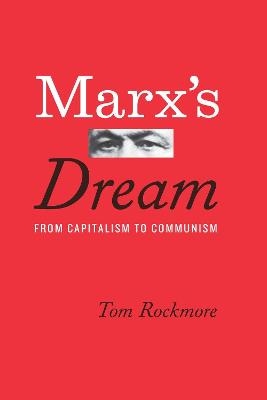
Marx's Dream
From Capitalism to Communism
Seiten
2018
University of Chicago Press (Verlag)
978-0-226-55452-5 (ISBN)
University of Chicago Press (Verlag)
978-0-226-55452-5 (ISBN)
Rockmore rescues Marx from Marxism, treating the man’s ideas separately from what was later made of them and bringing a refreshingly balanced approach to both.
Two centuries after his birth, Karl Marx is read almost solely through the lens of Marxism, his works examined for how they fit into the doctrine that was developed from them after his death. With Marx's Dream, Tom Rockmore offers a much-needed alternative view, distinguishing rigorously between Marx and Marxism. Rockmore breaks with the Marxist view of Marx in three key ways. First, he shows that the concern with the relation of theory to practice--reflected in Marx's famous claim that philosophers only interpret the world, while the point is to change it--arose as early as Socrates, and has been central to philosophy in its best moments. Second, he seeks to free Marx from his unsolicited Marxist embrace in order to consider his theory on its own merits. And, crucially, Rockmore relies on the normal standards of philosophical debate, without the special pleading to which Marxist accounts too often resort. Marx's failures as a thinker, Rockmore shows, lie less in his diagnosis of industrial capitalism's problems than in the suggested remedies, which are often unsound. Only a philosopher of Rockmore's stature could tackle a project this substantial, and the results are remarkable: a fresh Marx, unencumbered by doctrine and full of insights that remain salient today.
Two centuries after his birth, Karl Marx is read almost solely through the lens of Marxism, his works examined for how they fit into the doctrine that was developed from them after his death. With Marx's Dream, Tom Rockmore offers a much-needed alternative view, distinguishing rigorously between Marx and Marxism. Rockmore breaks with the Marxist view of Marx in three key ways. First, he shows that the concern with the relation of theory to practice--reflected in Marx's famous claim that philosophers only interpret the world, while the point is to change it--arose as early as Socrates, and has been central to philosophy in its best moments. Second, he seeks to free Marx from his unsolicited Marxist embrace in order to consider his theory on its own merits. And, crucially, Rockmore relies on the normal standards of philosophical debate, without the special pleading to which Marxist accounts too often resort. Marx's failures as a thinker, Rockmore shows, lie less in his diagnosis of industrial capitalism's problems than in the suggested remedies, which are often unsound. Only a philosopher of Rockmore's stature could tackle a project this substantial, and the results are remarkable: a fresh Marx, unencumbered by doctrine and full of insights that remain salient today.
Tom Rockmore is the Distinguished Humanities Chair Professor and professor of philosophy in the Institute of Foreign Philosophy at Peking University and the author of numerous books, including Art and Truth after Plato.
| Erscheinungsdatum | 12.06.2018 |
|---|---|
| Sprache | englisch |
| Maße | 152 x 229 mm |
| Themenwelt | Geisteswissenschaften ► Philosophie |
| Geisteswissenschaften ► Religion / Theologie | |
| Sozialwissenschaften ► Politik / Verwaltung ► Politische Systeme | |
| Sozialwissenschaften ► Politik / Verwaltung ► Politische Theorie | |
| Wirtschaft ► Allgemeines / Lexika | |
| ISBN-10 | 0-226-55452-X / 022655452X |
| ISBN-13 | 978-0-226-55452-5 / 9780226554525 |
| Zustand | Neuware |
| Haben Sie eine Frage zum Produkt? |
Mehr entdecken
aus dem Bereich
aus dem Bereich
über Alltagsorte des sozialen Zusammenhalts
Buch | Softcover (2024)
transcript (Verlag)
24,00 €


